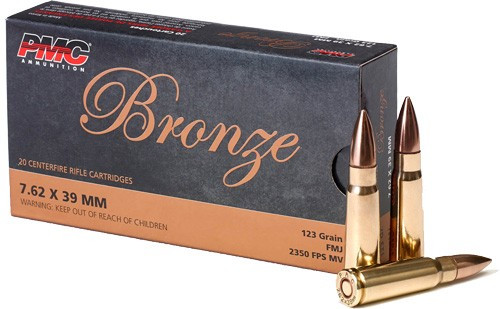-

Underwood Ammo
Underwood 7.62x39mm Controlled Chaos 123gr Copper Solid Monolithic Ammo
$61.17 - $516.00 -

DoubleTap Ammo
DoubleTap 739123X Tactical Copper Barnes TSX Lead Free 123 Grain 7.62x39mm 2400 fps
$54.99 - $466.00 -

Fort Scott Munitions Ammo
Fort Scott Munitions 7.62x39mm TUI 117gr Solid Copper Spun Ammo
$32.56 - $694.00 -

-

-

-

-

-

-

-

-

-

-

-

-

-

-

Tela Ammo
TelaAmmo 7.62x39 Steel cased 124 Grain Full Metal Jacket(FMJ) Non Corrosive
$233.65 - $455.04 -

-

-

-

-

7.62x39mm Ammo
Professionally Reviewed by:
Nathaniel Boos

Nathaniel Boos is a lifelong firearms enthusiast and shooter, renowned for his experience as a long-range shooter, ammunition importer/exporter, and firearms manufacturer. With years of hands-on experience, he is a trusted authority in the ammunition and firearms industry.
Credentials:
- • 2x Team Safari Competitor
- • KRG Training Level 1, 2, and Force on Force CQB certified
- • Licensed Texas Conceal Carry Holder
- • Kranz Firearms Training Group Advanced Carbine Certified
7.62x39mm: At a Glance
| Key Characteristics | |
|---|---|
| Firearm Type | Rifle, Carbine |
| Primer Type | Large Rifle |
| Used For | Military, Hunting, Sport Shooting |
| Case Design | Rimless, Tapered |
| Year Introduced | 1944 |
7.62x39mm: Pros and Cons
Pros
- ✔ Good balance of power and recoil
- ✔ Effective for medium-sized game hunting
- ✔ Widely available and relatively affordable
- ✔ Good penetration capabilities
- ✔ Suitable for various rifle platforms
Cons
- ✘ Limited long-range performance compared to other rifle cartridges
- ✘ Ballistic trajectory drops significantly at longer ranges
- ✘ Not as accurate as some modern rifle cartridges
- ✘ May be considered underpowered for larger game
- ✘ Some jurisdictions restrict its use due to military association
7.62x39mm Ammo: In Depth
The 7.62x39mm, also known as the 7.62 Soviet or .30 Russian Short, is one of the most widely used rifle cartridges in the world. Renowned for its reliability, moderate recoil, and effectiveness at medium ranges, this caliber has become a staple for military forces, hunters, and civilian shooters alike. The 7.62x39mm offers an impressive combination of power and controllability, making it suitable for a wide range of applications from combat to hunting medium-sized game.
History and Development
The 7.62x39mm cartridge was developed in the Soviet Union during World War II. It was introduced in 1944, towards the end of the war, as part of a program to create an intermediate cartridge for a new assault rifle. The cartridge was designed to bridge the gap between the less powerful pistol-caliber submachine guns and the more powerful full-sized rifle cartridges of the time.
The development of the 7.62x39mm was driven by the need for a cartridge that could offer effective firepower at typical combat ranges while still allowing for controllable automatic fire. Soviet weapons designers, including Mikhail Kalashnikov, achieved this by creating a cartridge with a relatively short case length and a moderate powder charge.
The 7.62x39mm's design incorporated a tapered case, which aided in reliable feeding and extraction in automatic firearms. This feature, combined with its moderate recoil and effective terminal ballistics, contributed to its rapid adoption by the Soviet military and later by many other countries around the world.
Throughout the Cold War, the 7.62x39mm gained immense popularity. It saw extensive use in conflicts worldwide, primarily due to its use in the AK-47 and its variants. The cartridge's reliability and effectiveness led to its adoption by numerous militaries, guerrilla groups, and later, civilian shooters.
In the civilian market, the 7.62x39mm has experienced several surges in popularity. The introduction of semi-automatic rifles chambered in this caliber opened up new possibilities for hunters and sport shooters. More recently, advancements in bullet design have improved the 7.62x39mm's ballistic performance, making it an even more attractive option for various shooting applications.
Today, the 7.62x39mm remains one of the most popular rifle cartridges globally. Its widespread use has led to continuous innovation in ammunition design, with manufacturers offering a wide range of options from practice rounds to high-performance hunting loads. The 7.62x39mm's enduring popularity is a testament to its reliability, effectiveness, and the balance it strikes between power and controllability.
Complete Timeline of 7.62x39mm Development:
7.62x39mm Performance
The 7.62x39mm offers a balanced performance profile that has made it a popular choice for military use, hunting, and recreational shooting. Here's a breakdown of its key performance characteristics:
| Characteristic | Performance |
|---|---|
| ► Velocity | 2,300-2,400 fps (123-grain bullets) 2,400-2,500 fps (122-grain bullets) Varies based on barrel length and load type |
| → Trajectory | Relatively flat at medium ranges Effective for hunting and combat within 300-400 yards |
| ⚡ Energy | 1,400-1,600 ft-lbs at the muzzle (122-123 grain bullets) Provides good stopping power for medium-sized game |
| ↕ Recoil | Moderate, less than full-power rifle cartridges Allows for quick follow-up shots and controllable automatic fire |
| ⦿ Accuracy | Capable of 2-3 MOA in quality rifles Sufficient for combat and hunting applications at medium ranges |
7.62x39mm: Bullet Weight vs. Muzzle Velocity
This chart shows how bullet weight affects muzzle velocity for common 7.62x39mm loads.
7.62x39mm: Effective Range for Different Applications
This table provides estimated effective ranges for 7.62x39mm ammunition in various applications. Ranges are based on typical bullet weights and velocities.
| Application | Effective Range (yards) | Notes |
|---|---|---|
| Military/Combat | 0-300 | Effective for most combat scenarios |
| Law Enforcement | 0-200 | Suitable for urban and rural engagements |
| Hunting (Medium Game) | 0-250 | Effective for deer and similar-sized game |
| Target Shooting | 0-400 | Accuracy diminishes beyond 400 yards |
| Self-Defense | 0-100 | Effective, but overpenetration is a concern |
Note: Effective ranges can vary based on factors such as bullet selection, shooter skill, wind conditions, and specific firearm characteristics. Always prioritize safety and adhere to local laws and regulations.
7.62x39mm: Barrel Length Effects on Performance
Barrel length can significantly affect 7.62x39mm performance. This chart illustrates the impact of different barrel lengths on velocity.
Understanding Barrel Length Effects
Barrel length affects 7.62x39mm performance in several ways:
- Longer barrels generally provide higher velocities due to more complete powder burn.
- Shorter barrels offer better maneuverability, but at the cost of velocity and potentially accuracy.
- Velocity increases tend to diminish after about 16-18 inches of barrel length for 7.62x39mm.
- Shorter barrels may produce more muzzle flash and noise due to incomplete powder burn.
The chart above visualizes how velocity increases with barrel length, with the width of each bar representing the relative velocity.
Note: Velocities are approximate and based on standard 123-grain FMJ loads. Actual velocities can vary based on specific ammunition, environmental conditions, and individual firearms. Always chronograph your specific gun/ammo combination for precise data.
Applications for 7.62x39mm
The 7.62x39mm's versatile performance profile makes it suitable for a wide range of applications:
Caliber Comparisons
To understand the 7.62x39mm's place in the rifle world, it's helpful to compare it to similar cartridges. Click on each comparison to see more details:
Recoil Energy Comparison
Compare the estimated recoil energy of 7.62x39mm with other popular rifle cartridges. (Based on a 7.5 lb rifle)
Ballistic Trajectory Comparison
This chart compares the ballistic trajectory (bullet drop) of 7.62x39mm with other popular rifle cartridges over distance.
Wind Drift Comparison
This chart compares the wind drift of 7.62x39mm with other popular rifle cartridges in a 10 mph crosswind.
Energy Retention Comparison
This chart compares the energy retention of 7.62x39mm with other popular rifle cartridges over distance.
Estimated Barrel Life Comparison
This chart provides a general comparison of estimated barrel life for 7.62x39mm and similar rifle cartridges. Actual barrel life can vary significantly based on factors such as firing schedule, ammunition quality, and maintenance.
| Cartridge | Estimated Barrel Life (Rounds) |
|---|---|
| 7.62x39mm |
|
| 5.56x45mm NATO |
|
| .308 Winchester |
|
| 6.5 Creedmoor |
|
| .300 Blackout |
|
Note: These are rough estimates and can vary greatly depending on usage, load data, cleaning regimen, and individual firearm characteristics. High-volume shooters may see shorter lifespans, while casual shooters might experience longer barrel life.
Sectional Density Comparison
Sectional density is a measure of a bullet's mass relative to its diameter. Higher sectional density generally indicates better penetration and energy retention.
| Cartridge | Bullet Weight (gr) | Sectional Density | Relative SD |
|---|---|---|---|
| 7.62x39mm | 123 | 0.183 |
|
| 5.56x45mm NATO | 62 | 0.177 |
|
| .308 Winchester | 168 | 0.253 |
|
| 6.5 Creedmoor | 140 | 0.287 |
|
| .300 Blackout | 125 | 0.188 |
|
Note: Sectional density is calculated as (bullet weight in pounds) / (bullet diameter in inches)². Higher sectional density generally indicates better penetration, but other factors like velocity and bullet construction also play significant roles in overall performance.
7.62x39mm: Frequently Asked Questions
For the most part, it doesn’t matter in an AK or an SKS: steel works just fine. Ruger recommends ammo made by American manufacturers for shooting through their firearms. You’ll likely get better accuracy in a 7.62x39mm bolt-action gun with brass cased ammo, just keep in mind that this is not a cartridge known for precision in the first place.
Absolutely. As previously mentioned, this is a .30 caliber cartridge with a muzzle velocity of around 2,400/fps. Just pay attention to proper bullet selection and keep your shots under 200 yds or so. Medium sized game can be taken with this cartridge at appropriate distances.
It’s more than adequate. Imported steel cased ammo is not a good option for home defense, however, as the steel core bullets will over penetrate.
Corrosive ammunition damages firearms, but only if you don’t clean your gun after you shoot. This is because the residue left after firing it attracts and traps moisture against metal surfaces. More info on that here.
While it used to be true that almost all 7.62x39mm ammo was corrosive, that’s not really the case anymore.
FOR US-PRODUCED AMMO - American-made 7.62x39mm ammo doesn’t use corrosive primers. While it’s still a good idea to clean your firearm after a range session, it won’t be required.
FOR IMPORTED AMMO - LOOK ON THE BOX! If the load uses non-corrosive primers, it will say so. If you see “Non-Corrosive” anywhere on the box, you’re good. If you don’t, time to clean.